- Home
- A P Bateman
Reaper Page 24
Reaper Read online
Page 24
Batumi, Georgia
King could see the lighthouse in the distance. It had been recently painted and he imagined that the up and coming town had seen some investment with the intention of seeing Batumi elevate to a holiday resort that appealed to couples and families, as well as casino goers and clubbers. The Ferris wheel would indicate that the town’s council envisaged more for the resort than blackjack and slot machines. Further up the seafront, King could see towers and other fairground attractions, that looked set in place for the summer. Perhaps the town council would follow the Spanish and import better sand, rather than the dark quarry dust and chippings the beach was made up of.
King knew the difference a few streets could make. The tourists wouldn’t see this aspect of Batumi though. Tenement housing, run down businesses and vacant properties. Some properties looked to have been broken into, squatters taking up residence. A few hundred metres off the strip, set back from the three parallel streets running along the seafront. There were a couple of bars, but they were dark and foreboding-looking places only the hardened traveller or misguided fool would wander into in a state of inebriation.
There were three of them. King had watched for an hour and was certain of the system they were using. He watched as a white Mercedes with large after-market exhausts and spinning wheel hubs pulled in, its windows as dark as coal. The driver’s window lowered, and a man casually walked over, his gait more swagger than purpose. He bent down, said very little as King watched the driver hand over a fold of banknotes. The man turned and walked back to the bar, where a youth of around fourteen took the money and darted down the alleyway. King had a good enough view to see the boy hover at the entrance to a tenement block. A scruffy-looking man appeared, took the money and stepped back inside. King watched for a few minutes, and then saw the man appear in the entrance and hand the youth a package. The boy ran back along the alley and stopped at the edge of the bar, handed the package to the frontman, who sauntered back over to the Mercedes. The window lowered again, and King could hear rap music fill the air. The man stepped back, and the Mercedes powered away, its rear wheels lighting up on the rough tarmac. The man sat back down at a table outside the bar and the youth had faded away into the alleyway. It was like a smooth-running restaurant – front of house, dining staff and chef. A drug chain that could easily be broken if the police happened by. Each heading their separate ways.
King started the car and drove past the bar, then turned first right, and then again. He parked the car near some dumpster bins and looked around. The car was a new model Dacia. A nothing car, but everything to somebody living here. He doubted it would be long before somebody tried to steal it, but he had taken out the insurance and he had noticed an Avis and Eurocar in the business centre of Batumi. It was only a short walk to the seafront and its lighthouse and Ferris wheel, he would head that way and work his way in on better streets.
He got out and opened the boot. He rummaged underneath the carpet and retrieved a single head tyre iron. He slipped it up his sleeve and closed the boot lid. The alley was open-ended, and King figured he’d found it as he crossed the road and glanced around, keeping alert, but making himself seem alert too. Trouble rarely looked for trouble, and with his broad shoulders and chest, athletic waist, close-cropped hair and pugilist’s brow, he looked like a serious opponent. The cat-like grace with which he crossed the road, hopped the pavement, his fists ready and his motions fluid, he could well have been heading through the crowd to a boxing ring.
King best-guessed the building – now on his left – and stepped into the doorway on his right. He had a good eyes-on for both the entrance of the tenement block and the youth who would come with the money and take back the drugs. It was now only a matter of time.
The alley smelled of urine and damp over domestic waste. It was closely hemmed in by buildings built in the Soviet era, where thought was only towards housing the masses and ensuring workers of certain demographics had accommodation and were close to work. In this case, most probably the port for which Batumi had once been a crucial link for the Soviet empire. King guessed the place had seen better days. Most of it appeared empty now. Since it broke away from the Soviet Union, Georgia had become a hub for travellers, people looking for the next best thing. The beach resorts of the Black Sea were never going to compete against the Costas or the south of France, but they were no worse than much of Italy’s or Cyprus’, and holidays on the Black Sea could cost half the price as those destinations. The money put into Batumi’s seafront and new town showed that commerce was set to grow. Places like this, the rotten, degraded pockets of poverty would be gone before long. And the drug dealers would have to ply their trade elsewhere.
King could see a garish yellow Range Rover slow and pull up outside the bar. It was an old model vogue lowered and kitted out to loosely represent a Range Rover Sport. The windows were blacked out, and already King could hear some R&B coming out hard. A moment later, the boy ran down the alleyway towards him. The boy shouted when he reached the entrance and thirty seconds later the man appeared. King could see him clearly now. Shaved head, bearded, tattooed and muscular. He snapped at the boy as he took the money. King could see he had a pistol tucked into the back of his waistband. He disappeared, came back moments later with the package. The boy ran back towards the bar and King stepped out of the doorway and crossed the alleyway.
The entrance was dark, and a cage door was propped open, the man almost through when King stepped inside. He let the tyre iron drop down his sleeve. He was only two paces behind the man when he turned around. King swung the iron, but the man was quick. He dodged left, drew backwards and went for the pistol. King swung again, the iron swiping an inch in front of the man’s face. He kicked out, caught the man in the groin. The man dropped, but caught hold of King’s shirt as he fell, and he pulled King downward. King smashed the iron down on the man’s back and he cried out as he let go and fell. He had fight training, and as he curled into a ball, his hands held in a tight boxer’s guard, he kicked wildly and repeatedly, stopping King from attacking further. King kicked downwards, keeping his eyes on the man’s hands. There was still a firearm in the mix, but it was ok until the man reached for it, which he would do if King did not keep up the momentum of the assault. He struck the man’s shin with the tyre iron, then went to take a better swing when he felt himself pulled from behind. Both the frontman and the boy were grabbing at him, and it was enough time for the man on the ground to get into a better position. The frontman was reaching for a blade. King had left the flick-knife in France, without hold luggage, he couldn’t risk it in his carry-on. King kicked backwards, keeping the man on the ground busy. He caught him in the face, heard the crunch of bone, keeping his eyes on the knife. The frontman swung, as King caught hold of the boy by his shirt collar and met the attack head on, using him as a shield. The boy was slightly built, and after his back took the swipe of the blade – a grimace on his face – King smashed the youth back into the frontman, putting distance between himself and the blade. The back of the boy’s head was in front of the frontman’s face, and King cupped his face with the palm of his hand and smashed his head backwards into the frontman’s jaw. Once, twice, three times… By the fourth time, the man had slumped enough for the boy’s head to smash his nose flat. He slid down the wall and King let the youth go, where he fell and joined him. As he turned, the man on the floor was reaching for the pistol. King darted forward and punched the man with a right-cross to his jaw. He was out cold before he fell backwards onto the urine-soaked concrete.
King was heaving for breath. It hadn’t gone like he had wanted it to. But things seldom ever did. He took the pistol out of the man’s jeans. And tucked it into his own. He turned to the boy, who although wasn’t out cold, was lying down, clearly shocked. He was holding the back of his head, tears in his eyes and panting for breath. King caught hold of him and pulled him forwards to check the wound. His head was swelling, but not bleeding. His back had taken a slash, but it wasn’t deep. The kn
ife had been blunt and had pulled across the boy’s shirt, cutting in places, scratching for the most-part. The blade was most likely dirty, and the boy would need medical attention. But it was the swelling to his head that King was most concerned about. He had taken quite a battering. He cursed quietly to himself. But he pushed the boy back down onto the unconscious body of the frontman and went about checking the other man’s pockets. There was a spare magazine for the 9mm Makarov pistol which King took, along with the roll of banknotes from the drugs transaction.
He looked back at the boy. “You speak English?”
The boy nodded.
“How old are you?”
“Fifteen.”
King could see a wispy moustache beginning to poke through, but he was a long way off shaving. He looked the boy up and down. He didn’t feel guilty, worse things had happened to him by that age. But he felt compassion, because he knew when these men woke up, the boy would be ferrying drugs and money and would not be going anywhere near a hospital.
“I’m sorry you got hurt,” he said. “Come with me, and I’ll drop you outside the medical centre. I’ve seen one in the new town.”
The boy looked hesitant, but he removed his hand from the back of his head, checked his fingers for blood and shrugged.
“Your head needs a cold pack,” King explained. “And you may need a stitch or two in your back, but you definitely need it cleaned and perhaps some antibiotics in case it gets infected.” King looked at the state of the floor, was certain it was most likely infected already.
“Okay,” the boy shrugged, like it was an everyday occurrence.
King led the way and the boy followed. He had no idea why the boy did not run, but as he stepped out into the light upon leaving the alleyway, he wondered if the boy had any choice in the work he did.
Thankfully the car had been left alone, and King opened the door, let the boy slide gingerly into the front seat.
“Who are those men?” King asked.
The boy shrugged again. “Just men,” he said. “My mother died, my father went to work in the Ukraine last year, picking flowers. He hasn’t been in touch since…”
King nodded. He should have been back between the growing season. He knew that tulips, poppies, orchids and roses were grown in the Ukraine. It was seasonal work relying on migrant workers. He doubted the boy would see him again.
“Those men, they pay you?”
“Some.”
King drove quickly, threaded his way through the streets until he found himself on the seafront. He passed the lighthouse, then followed the road around to the left, away from the seafront and towards the new town. He fished out the wad of banknotes, around a thousand Lari worth approximately three-hundred pounds. He tossed it into the boy’s lap. “Take this,” he said. “Maybe it will be enough to get away from here. You have relatives?”
“An aunt and cousins in Tbilisi.”
“Go there. Don’t go back to those men. They’re using you and no good will come from it. I know. I started dealing drugs for people like that, pretty soon I was handing out beatings and in and out of prison.” He pulled up in front of the medical centre and took out his wallet, retrieved a stack of Lari, around fifty-pounds Stirling. “Get yourself patched up. Get the wound cleaned, stitched and ask for anti-biotics. And get a cold pack on that head bump.”
The boy opened the door, went to thank him, but King pulled away and the door shut of its own accord once he got up to about thirty-miles-per-hour. He checked his watch. He had made good time. He had a gun and ammunition, and he had an hour’s drive ahead of him before he had to use it.
59
King had stopped at a builder’s merchants, having been unable to find an extensive DIY store. He had found most of the things he needed, paying in cash, but had also stopped at a pharmacy, a supermarket and a service station for the rest of the things he would need. A military surplus store located on the side of the road which had been advertised by a Soviet T-62 tank, provided him with the last of his purchases. Although the store did not sell firearms, it still provided King with a sturdy combat knife, a gas stove, some mess-tins and a dozen aluminium water bottles in canvas sleeves. He picked out some olive cargo trousers to go with his grey T-shirt and tan leather jacket, and a pair of surplus boots to help him blend into the landscape and provide solid foot-ware for the rocky terrain. He wore a balanced combination that would afford him cover, but not have him dressed like a soldier if he found himself in a different situation that required him to blend into a crowd.
The mountain road took him higher, winding through woodland and pastures, affording glimpses of the Black Sea. King could see how the sea got its name. Not land-locked, but separated by the narrow Bosporus straight, the Sea of Marmara and the Aegean Sea from the sparkling blue waters of the Mediterranean. The Black Sea was dark and slick, with choppy waves rather than small rollers, and the waters looked deep and black on all but the brightest and clearest of skies, or calmest of seas.
King found a track and pulled off the road, checking his mobile phone signal and sending a short text, before making his way cautiously down the track, the Dacia coping with the ruts and potholes without grounding. The track led to nothing more than a turning point, where King switched off the engine and typed a text, he checked for mistakes forced by the auto-correct before sending.
The silence as King got out of the car was blissful. The air was warm, but clean. He felt the sun on his face and was buoyed by the promise of getting ahead of Helena. He would soon be in control, and he relished turning the tables on his enemy. He received a message back, checked it and smiled. He had felt so alone until now. He had spent his entire career working alone and even when he had assistance or joined forces with another intelligence service, or agency from another country, he knew he would ultimately be alone. He had been a deniable asset. Nobody would trade for him, negotiate his release. He should have been used to it, but in his short-time working with MI5 and partnering Caroline on various cases, he had grown used to being a part of a team. But it wasn’t only that. King had felt from the outset, that the price of Caroline being held for ransom was too high, as was the risk of failure on his part. The pressure was insurmountable.
King opened the hatch of the car and started to take out the equipment and items he had bought. He set up the gas stove and arranged the mess-tins around it. Next, he took out the aluminium water bottles and set about puncturing the lids with his knife. He then arranged them in the boot of the car where it was a decidedly smoother surface than the ground. He opened a bottle of thick bleach and poured it into a mess-tin. Then he scooped out petroleum jelly from a large tub and placed it in the bleach, along with just the right amount of borax and potassium nitrate, also known as salt-peter. King placed the mess-tin on the gas stove and watched it melt the petroleum jelly. He sprinkled in the iron filings - to aid as an electrical conductor rather than shrapnel - and stirred the mix together with a stick. As the mix boiled and licked the edges of the mess-tin, King took it off the heat and stirred gently, the mix thinning further and gradually darkening in colour. He placed the tin in the boot of the car, then opened the bag of two-inch screws into his hand and fed them into two of the bottles, each about half-full. He then poured the mix into the bottles right up to the top and threw the mess-tin onto the ground. He took out a length of electrical wire, East-European spec, with just a negative and a positive. He used a pair of snips to cut the length, then fed the wires through the lid until approximately four-inches of wire protruded. Next, he coiled the wires separately around his finger so that both lengths of negative and positive resembled a spring. King eased the lengths into the warm liquid and fastened the lids in place. He then took two battery power units and a pin-timer delay out of the boot and wired the connections, leaving the batteries out until he was ready. He set the timers for five-minutes and taped the consumer units to the side of the bottles with duct-tape. King repeated the process twice more, imperative he use clean mess-tins and
did not change the order in which he made the mixes, and finally stood back to admire his handiwork. Six time-delay Improvised Explosive Devices – or IED’s - each one capable of blowing a car into the air into pieces, or he estimated enough to take down two average-sized houses if set correctly.
King then set about cutting lengths of string and soaking them in sugar and liquid paraffin. He left them for twenty-minutes while he made four more bottles of the mix. He checked that the holes in the lids were made larger, to allow for air, then took the string out of the paraffin and allowed them to dry in the warm air. Once they were dry enough to the touch, he folded them in half, and pushed both ends through the lid and deep into the liquid compound, which was already starting to thicken. He tightened up the lids, leaving a ten-inch loop protruding. He tested a spare length of the string with his lighter, watched as it burned fiercely, counting the whole time. The length of string burned away, and King dropped the ember to the ground. He then adjusted the lengths of string in the bottles and taped them in place. He figured they would burn for ten-seconds before heating the mix enough to initiate and cause detonation. The initiation would use a third of the mix, making detonation around two-thirds as powerful as the electrically-detonated devices. Enough to disable a car, breach a door or take down a group of men effectively.
King took out a bottle of water, drank down half a litre or so and washed his hands thoroughly. He dried them on his shirt then took out the 9mm Makarov pistol and checked it over. He unloaded the magazine, inspected the bullets. They looked like factory loads as far as he could tell, and the shell cases were in good condition. He never fired anything he hadn’t re-loaded himself, or that wasn’t factory-loaded if he could help it. But beggars couldn’t be choosers. He unloaded the second magazine, checked the bullets, then stripped the pistol down. An easy weapon to take apart – he simply pulled down the trigger guard, slipped it sideways onto its internal holding lug, then pulled back the slide all the way, lifted and dropped it forward and off the barrel. He sprayed the weapon well with what he guessed was Georgia or Russia’s equivalent of WD40 and rubbed it all over with a dry cloth. He oiled the spring, inspected the barrel, squirted a little oil down it and allowed it to drain. Drug dealers tended to pose and threaten with their firearms, but there was no telling whether this weapon had been fired in forty-years. King suspected it had started off life as a well-used military piece but would have been stolen and sold on many times over since then. It looked in ok condition. He oiled and checked the magazines, reloaded them checking the spring tension. He put them down, put the pistol back together, checked the action, then loaded one of the magazines, chambered a round and applied the safety, which dropped the hammer onto the safe bar. He tucked the pistol into his right trouser pocket and put the spare magazine into the other.

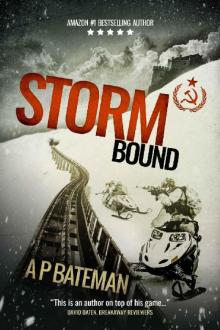 Stormbound
Stormbound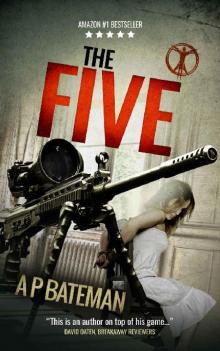 The Five
The Five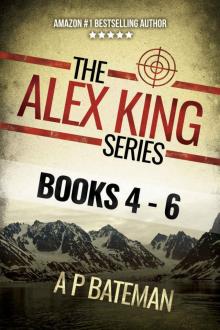 The Alex King Series
The Alex King Series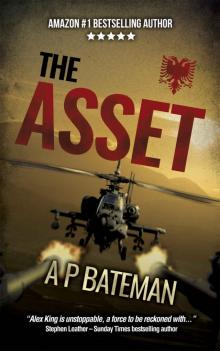 The Asset (Alex King Book 10)
The Asset (Alex King Book 10)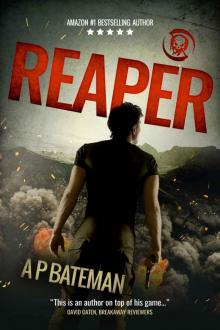 Reaper
Reaper Breakout
Breakout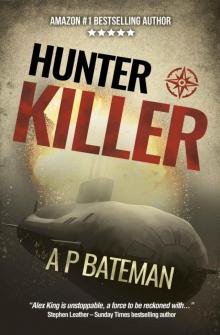 Hunter Killer - Alex King Series 12 (2021)
Hunter Killer - Alex King Series 12 (2021)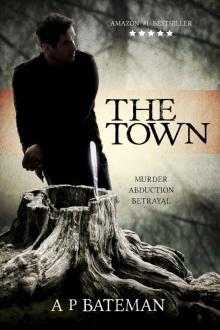 The Town (Rob Stone Book 2)
The Town (Rob Stone Book 2)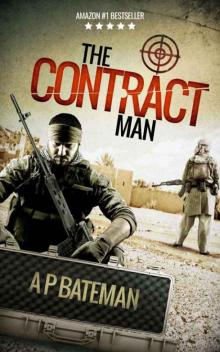 The Contract Man
The Contract Man The Island (Rob Stone Book 3)
The Island (Rob Stone Book 3)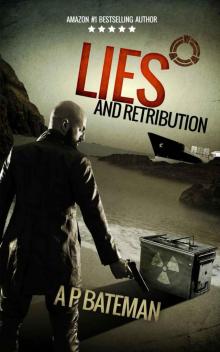 Lies and Retribution (Alex King Book 2)
Lies and Retribution (Alex King Book 2)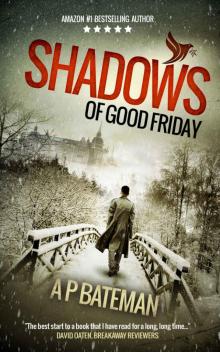 Shadows of Good Friday (Alex King Book 3)
Shadows of Good Friday (Alex King Book 3)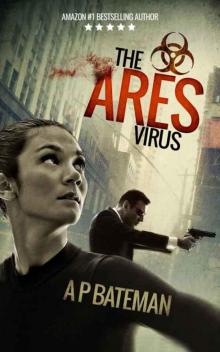 The Ares Virus
The Ares Virus